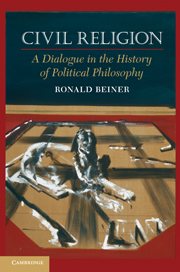Book contents
Conclusion
Published online by Cambridge University Press: 05 June 2012
Summary
There is something nice about being in the dark, he discovers, something thrilling about not knowing what is going to happen next. It keeps you alert, he thinks, and there's no harm in that, is there? Wide awake and on your toes, taking it all in, ready for anything.
– Paul AusterThe readers should be alone with the books, and if anyone dared to say anything about them, they would be shot or imprisoned right on the spot. Yes, shot.…You should let people fight with the books on their own and rediscover what they are and what they are not.
– Philip RothMy primary aim in this book has been to take a large group of leading thinkers from the last half-millennium of Western political philosophy, and try to unpack some of the complexities, riddles, ironies, tensions, and paradoxes in their views about religion. The spirit in which I have tried to read the texts analyzed in the preceding chapters is captured in the two epigraphs here. That spirit involves, first, not presuming that one knows in advance where the texts are going to go, and being radically open to all the unexpected twists and turns in the texts – that is, accepting that one is always inescapably “in the dark,” not only about the deepest intentions of the authors of the texts but also about the philosophical issues that they (and we) are most concerned to address. Advancing one's understanding is always a matter of plunging fearlessly into the unknown. Second, my conception of the theoretical enterprise involves striving for a direct, largely unmediated relationship to the texts. This may seem, according to many understandings of scholarly practice, unscholarly, but according to my understanding of the essential practice of political philosophy, existing scholarly traditions can be distracting as well as helpful. By necessity the texts are primary, and the conversation that composes a work in political philosophy is in the first instance a conversation with (not merely about) the texts themselves.
Above all, in this study I have wanted to think about master-thinkers in the tradition of political philosophy by analogy with the immediacy of dialogue that often occurs between great artists – dialogue pursued as if anything else intervening in this dialogue could be filtered out as irrelevant. I have in mind, for instance, the intensity with which Eric Fischl puts his own artistic concerns in dialogue with those of Matisse. Admittedly, no real dialogue between artists or thinkers can completely fulfill this conception of pure immediacy; but attempting to present the relationship between political philosophers as if this conception were capable of fulfillment opens up a dimension of intellectual possibility that is absent in other ways of doing political philosophy (and that the greatest practitioners of political philosophy themselves almost certainly intended at least in part to live up to).
- Type
- Chapter
- Information
- Civil ReligionA Dialogue in the History of Political Philosophy, pp. 409 - 420Publisher: Cambridge University PressPrint publication year: 2010



